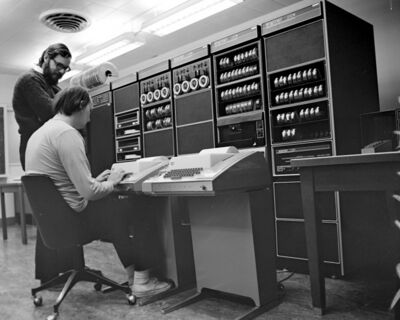Difference between revisions of "Dennis Ritchie"
From Computer History Wiki
m (→External links: + Ritchie Thesis paper) |
m (→External links: +imgs) |
||
| Line 18: | Line 18: | ||
** [https://www.bell-labs.com/usr/dmr/www/odd.html Odd Comments and Strange Doings in Unix] | ** [https://www.bell-labs.com/usr/dmr/www/odd.html Odd Comments and Strange Doings in Unix] | ||
** [https://www.bell-labs.com/usr/dmr/www/portpapers.html Papers about Unix Portability] | ** [https://www.bell-labs.com/usr/dmr/www/portpapers.html Papers about Unix Portability] | ||
| + | ** [https://www.bell-labs.com/usr/dmr/www/picture.html An amusing photo] - "Ken and [DMR] in front of a PDP-11" | ||
| + | * [https://computerhistory.org/wp-content/uploads/2019/10/102685442.03.01.jpg Ken and DMR] - from another angle | ||
* [https://computerhistory.org/blog/discovering-dennis-ritchies-lost-dissertation/ Discovering Dennis Ritchie's Lost Dissertation] | * [https://computerhistory.org/blog/discovering-dennis-ritchies-lost-dissertation/ Discovering Dennis Ritchie's Lost Dissertation] | ||
* [https://www.cs.princeton.edu/~bwk/dmr/doceng22.pdf How did Dennis Ritchie Produce his PhD Thesis? A Typographical Mystery] | * [https://www.cs.princeton.edu/~bwk/dmr/doceng22.pdf How did Dennis Ritchie Produce his PhD Thesis? A Typographical Mystery] | ||
[[Category: People]] | [[Category: People]] | ||
Revision as of 23:32, 17 September 2023
Dennis Ritchie (often referred to as dmr) was an influential American computer scientist, best known for his work on UNIX and the C programming language - both produced in collaboration with Ken Thompson.
He attended Harvard, where he received an undergraduate degree in 1963, and a doctoral degree in 1968. He went to work at Bell Labs in 1967, joining the Computing Sciences Research Center; he spent the rest of his career at the Labs, and its descendants. In 1968, he was part of the Bell team which joined the Multics project; after Bell pulled out of Multics, he and Thompson eventually fell into UNIX and C.
Further reading
- Brian Kernighan, UNIX: A History and a Memoir - has a brief bio of Ritchie at the end of Chapter 3
External links
- Dennis Ritchie's Home Page
- The Unix Time-sharing System (PDF) - 1978 BSTJ verson
- The Evolution of the Unix Time-sharing System (PDF)
- The UNIX Time-sharing System - A Retrospective (PDF)
- The Development of the C Language (PDF)
- Odd Comments and Strange Doings in Unix
- Papers about Unix Portability
- An amusing photo - "Ken and [DMR] in front of a PDP-11"
- Ken and DMR - from another angle
- Discovering Dennis Ritchie's Lost Dissertation
- How did Dennis Ritchie Produce his PhD Thesis? A Typographical Mystery
